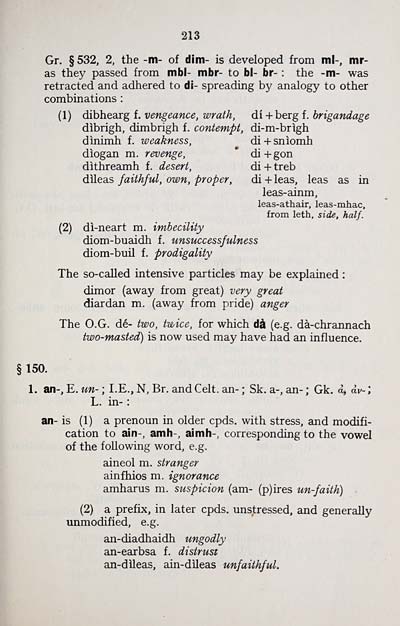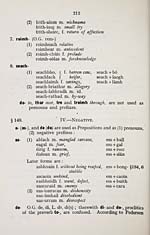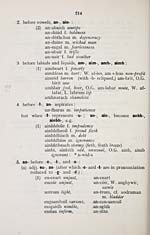Matheson Collection > Gaelic grammar, containing the parts of speech and the general principles of phonology and etymology, with a chapter on proper and place names
(233)
Download files
Complete book:
Individual page:
Thumbnail gallery: Grid view | List view

213
Gr. § 532, 2, the -m- of dim- is developed from ml-, mr-
as they passed from mbl- mbr- to bl- br- : the -m- was
retracted and adhered to di- spreading by analogy to other
combinations :
(1) dibhearg f. vengeance, wrath, di -l-berg f. brigandage
dibrigh, dimbrigh f. contempt, di-m-brigh
dinimh f. weakness, di+sniomh
diogan m. revenge, ' di +gon
dithreamh f . desert, di + treb
dWeas faithful, own, proper, di+leas, leas as in
leas-ainm,
leas-athair, leas-mhac.
from leth, side, half.
(2) di-neart m. imbecility
diom-buaidh f. unsuccessfulness
diom-buil f. prodigality
The so-called intensive particles may be explained :
dimor (away from great) very great
diardan m. (away from pride) anger
The O.G. dè- two, twice, for which da (e.g. dà-chrannach
two-masted) is now used may have had an influence.
§150.
1. an-, E. un- ; I.E., N, Br. and Celt, an- ; Sk. a-, an- ; Gk. a, dv- ',
L. in- :
an- is (1) a prenoun in older cpds. with stress, and modifi-
cation to ain-, amh-, aimh-, corresponding to the vowel
of the following word, e.g.
aineol m. stranger
ainfhios m. ignorance
amharus m. suspicion (am- (p)ires un-faith)
(2) a prefix, in later cpds. unstressed, and generally
unmodified, e.g.
an-diadhaidh ungodly
an-earbsa f. distrust
an-dileas, ain-dileas unfaithful.
Gr. § 532, 2, the -m- of dim- is developed from ml-, mr-
as they passed from mbl- mbr- to bl- br- : the -m- was
retracted and adhered to di- spreading by analogy to other
combinations :
(1) dibhearg f. vengeance, wrath, di -l-berg f. brigandage
dibrigh, dimbrigh f. contempt, di-m-brigh
dinimh f. weakness, di+sniomh
diogan m. revenge, ' di +gon
dithreamh f . desert, di + treb
dWeas faithful, own, proper, di+leas, leas as in
leas-ainm,
leas-athair, leas-mhac.
from leth, side, half.
(2) di-neart m. imbecility
diom-buaidh f. unsuccessfulness
diom-buil f. prodigality
The so-called intensive particles may be explained :
dimor (away from great) very great
diardan m. (away from pride) anger
The O.G. dè- two, twice, for which da (e.g. dà-chrannach
two-masted) is now used may have had an influence.
§150.
1. an-, E. un- ; I.E., N, Br. and Celt, an- ; Sk. a-, an- ; Gk. a, dv- ',
L. in- :
an- is (1) a prenoun in older cpds. with stress, and modifi-
cation to ain-, amh-, aimh-, corresponding to the vowel
of the following word, e.g.
aineol m. stranger
ainfhios m. ignorance
amharus m. suspicion (am- (p)ires un-faith)
(2) a prefix, in later cpds. unstressed, and generally
unmodified, e.g.
an-diadhaidh ungodly
an-earbsa f. distrust
an-dileas, ain-dileas unfaithful.
Set display mode to: Large image | Transcription
Images and transcriptions on this page, including medium image downloads, may be used under the Creative Commons Attribution 4.0 International Licence unless otherwise stated. ![]()
| Permanent URL | https://digital.nls.uk/76602744 |
|---|
| Description | Items from a collection of 170 volumes relating to Gaelic matters. Mainly philological works in the Celtic and some non-Celtic languages. Some books extensively annotated by Angus Matheson, the first Professor of Celtic at Glasgow University. |
|---|
| Description | Selected items from five 'Special and Named Printed Collections'. Includes books in Gaelic and other Celtic languages, works about the Gaels, their languages, literature, culture and history. |
|---|

